Related Research Articles
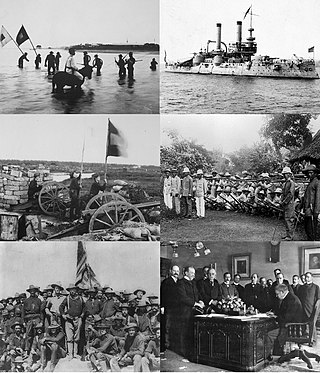
The Spanish–American War began in the aftermath of the internal explosion of USS Maine in Havana Harbor in Cuba, leading to United States intervention in the Cuban War of Independence. The war led to the United States emerging predominant in the Caribbean region, and resulted in U.S. acquisition of Puerto Rico, Guam, and the Philippines. It also led to United States involvement in the Philippine Revolution and later to the Philippine–American War.
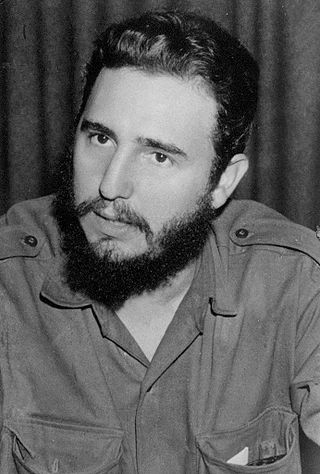
Fidel Alejandro Castro Ruz was a Cuban revolutionary and politician who was the leader of Cuba from 1959 to 2008, serving as the prime minister of Cuba from 1959 to 1976 and president from 1976 to 2008. Ideologically a Marxist–Leninist and Cuban nationalist, he also served as the first secretary of the Communist Party of Cuba from 1965 until 2011. Under his administration, Cuba became a one-party communist state; industry and business were nationalized, and socialist reforms were implemented throughout society.
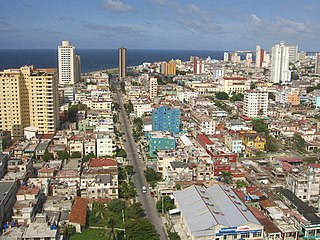
Havana is the capital and largest city of Cuba. The heart of the La Habana Province, Havana is the country's main port and commercial center. It is the most populous city, the largest by area, and the second largest metropolitan area in the Caribbean region. The population in 2012 was 2,154,454 inhabitants, and its area is 728.26 km2 (281.18 sq mi) for the capital city side and 8,475.57 km2 for the metropolitan zone.

Fulgencio Batista y Zaldívar was a Cuban military officer and politician who served as the elected president of Cuba from 1940 to 1944 and as a military dictator from 1952 until his overthrow in the Cuban Revolution in 1959.
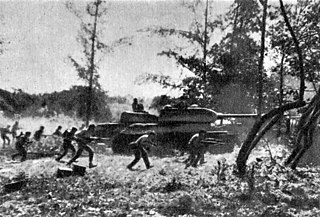
The Bay of Pigs Invasion was a failed military landing operation on the southwestern coast of Cuba in 1961 by the United States of America and the Cuban Democratic Revolutionary Front (DRF), consisting of Cuban exiles who opposed Fidel Castro's Cuban Revolution, clandestinely financed and directed by the U.S. government. The operation took place at the height of the Cold War, and its failure influenced relations between Cuba, the United States, and the Soviet Union.

José Julián Martí Pérez was a Cuban nationalist, poet, philosopher, essayist, journalist, translator, professor, and publisher, who is considered a Cuban national hero because of his role in the liberation of his country from Spain. He was also an important figure in Latin American literature. He was very politically active and is considered an important philosopher and political theorist. Through his writings and political activity, he became a symbol of Cuba's bid for independence from the Spanish Empire in the 19th century, and is referred to as the "Apostle of Cuban Independence". From adolescence on, he dedicated his life to the promotion of liberty, political independence for Cuba, and intellectual independence for all Spanish Americans; his death was used as a cry for Cuban independence from Spain by both the Cuban revolutionaries and those Cubans previously reluctant to start a revolt.
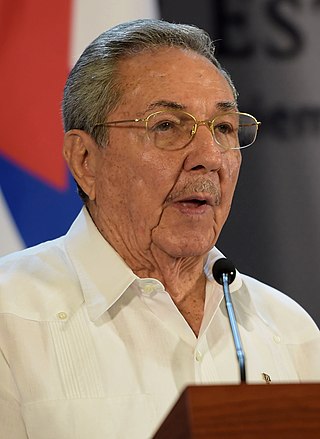
Raúl Modesto Castro Ruz is a Cuban retired politician and general who served as the first secretary of the Communist Party of Cuba, the most senior position in the one-party communist state, from 2011 to 2021, and President of Cuba between 2008 and 2018, succeeding his brother Fidel Castro.
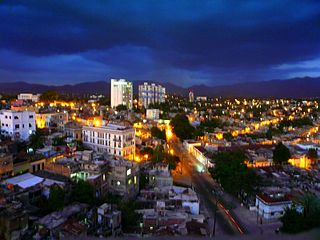
Santiago de Cuba is the second-largest city in Cuba and the capital city of Santiago de Cuba Province. It lies in the southeastern area of the island, some 870 km (540 mi) southeast of the Cuban capital of Havana.

The Cuban Revolution was the military and political effort to overthrow Fulgencio Batista's dictatorship which reigned as the government of Cuba between 1952 and 1959. It began after the 1952 Cuban coup d'état which saw former president and military general, Fulgencio Batista topple the nascent Cuban democracy and consolidate power. Among those opposing the coup was Fidel Castro, then a novice attorney who attempted to contest the coup through Cuba's judiciary. Once these efforts proved fruitless, Fidel Castro and his brother Raúl led an armed attack on the Cuban military's Moncada Barracks on 26 July 1953. Following the attack's failure, Fidel Castro and his co-conspirators were arrested and formed the 26th of July Movement (M-26-7) in detention. At his trial, Fidel Castro launched into a two hour speech that won him national fame as he laid out his grievances against the Batista dictatorship. In an attempt to win public approval, Batista granted amnesty to the surviving Moncada Barracks attackers and the Castros fled into exile. During their exile, the Castros consolidated their strategy in Mexico and subsequently reentered Cuba in 1956, accompanied by Che Guevara, whom they had encountered during their time in Mexico.
Bolero is a genre of song which originated in eastern Cuba in the late 19th century as part of the trova tradition. Unrelated to the older Spanish dance of the same name, bolero is characterized by sophisticated lyrics dealing with love. It has been called the "quintessential Latin American romantic song of the twentieth century".

Cuban cuisine is largely based on Spanish cuisine with influence from Taino, African and other Caribbean cuisines. Some Cuban recipes share spices and techniques with Spanish, Taino and African cooking, with some Caribbean influence in spice and flavor. This results in a blend of several different cultural influences. A small but noteworthy Chinese influence can also be accounted for, mainly in the Havana area. There is also some Italian influence. During colonial times, Cuba was an important port for trade, and the Spanish ancestors of Cubans brought with them the culinary traditions of different parts of Spain.

Antonio Sánchez de Bustamante y Sirven was a Cuban lawyer, educator, politician and international jurist. He promoted the existence of a common American regulation for private international law. For this reason, the sixth Pan-American Congress took place in Cuba in 1928, in the final document, the Treaty of Havana is attached in the annex of the Code of Private International Law.

The Cuba national football team represents Cuba in men's international football, and is controlled by the Football Association of Cuba. Nicknamed Leones del Caribe, the team represents all three FIFA, Caribbean Football Union and Confederation of North, Central American and Caribbean Association Football (CONCACAF).
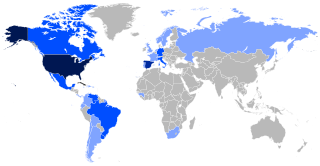
Cubans are the citizens and nationals of Cuba. The Cuban people have varied origins with the most spoken language being Spanish. The larger Cuban diaspora includes individuals that trace ancestry to Cuba and self-identify as Cuban but are not necessarily Cuban by citizenship. The United States has the largest Cuban population in the world after Cuba.

Cuba, officially the Republic of Cuba, is an island country, comprising the island of Cuba, Isla de la Juventud, and 4,195 islands, islets and cays surrounding the main island. It is located where the northern Caribbean Sea, Gulf of Mexico, and Atlantic Ocean meet. Cuba is located east of the Yucatán Peninsula (Mexico), south of both Florida and the Bahamas, west of Hispaniola, and north of Jamaica and the Cayman Islands. Havana is the largest city and capital. Cuba is the third-most populous country in the Caribbean after Haiti and the Dominican Republic, with about 10 million inhabitants. It is the largest country in the Caribbean by area.

Havana’s International Book Fair is an annual public festival to promote Cuban government sanctioned books and writing that spans between February and March. The festival begins in Havana at the Fortaleza de San Carlos de la Cabaña, an 18th-century Spanish construction, and spreads east and west of the capital to all provinces and many municipalities. The book fair ends in the eastern city of Santiago de Cuba. The fair first took place in 1982, and occurred every two years until 2000 when it became an annual tradition. The festival consists of book vendors, poetry readings, children’s activities, art exhibitions, and concerts in the evenings. It is considered Cuba’s premier cultural event, as well as the event with the highest attendance in Havana. The 18th annual International Book Fair in 2009 had approximately 600,000 visitors.

Ernesto "Che" Guevara was an Argentine Marxist revolutionary, physician, author, guerrilla leader, diplomat, and military theorist. A major figure of the Cuban Revolution, his stylized visage has become a ubiquitous countercultural symbol of rebellion and global insignia in popular culture.

The Captaincy General of Cuba was an administrative district of the Spanish Empire created in 1607 as part of Habsburg Spain attempt to better defend and administer its Caribbean possessions. The reform also established captaincies general in Puerto Rico, Guatemala and Yucatán.

Miguel Díaz-Canel Bermúdez is a Cuban politician and engineer. He has served as the 8th First Secretary of the Communist Party of Cuba since 2021 and as the 17th President of Cuba since 2019. In his capacity as First Secretary he is the most powerful person in the Cuban government.
References
- Diccionario Enciclopedico Grijalbo, ISBN 84-253-2675-3